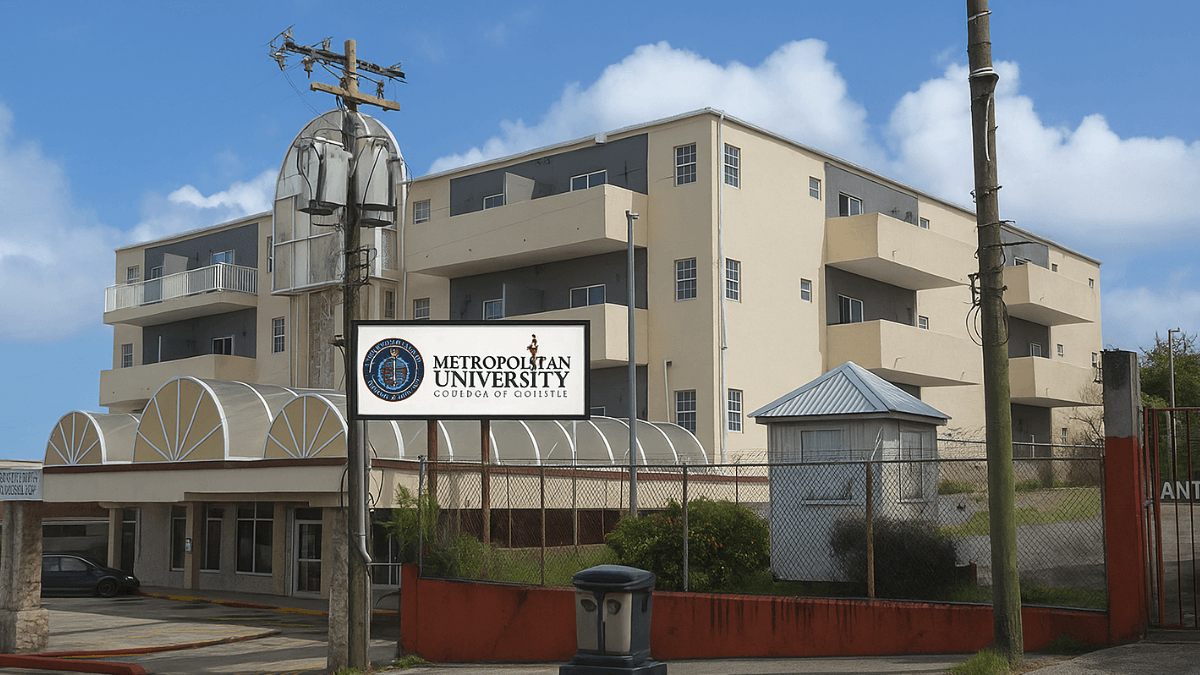
☝️ At a glance
- Metropolitan University College of Medicine is a well-recognised medical university located in the Caribbean.
- The University offers its services through its integrated curriculum, smart classrooms, advanced laboratories, and a brilliant faculty team.
- The rolling admission policy allows for admission flexibility to students.
- Living & studying at the university offers not only academic success but also allows you to witness the climatic supremacy of the place.
Introduction
The journey to becoming a world-class physician or a skilled surgeon begins with the right educational partner. Metropolitan University College of Medicine is a leading medical college that offers advanced medical education, combining innovation, clinical excellence, and international standards.
The university trained its students to become outstanding future doctors with a solid grounding in basic sciences, clinical rotations, and exceptional patient care. In this article, we will provide you with a complete overview of the university, covering all important aspects.
About Metropolitan University College of Medicine
Metropolitan University College of Medicine is a well-recognised medical university located in the Caribbean. It has the accreditation with the Barbuda National Accreditation Board and is listed in the World Directory of Medical Schools (WDOMS). With its establishment in 2017, it is offering well-structured MBBS and MD programs to form students as skilled physicians who can serve their services around the world.
Why choose Metropolitan University College of Medicine?
Beyond delivering quality medical education, many other reasons make this university a preferred destination for many international students. These reasons involve –
The programs of the university follow international standards and a comprehensive curriculum to build a solid foundation of all basic science concepts and clinical science programs.
The university has various validations from global health care bodies, including the Government of Antigua and Barbuda, the World Health Organisation, the Medical Council of India, the Foundation for Advancement of International Medical Education and Research, and so on.
The university houses top-class medical professionals as faculty members, who are skilled and well-experienced in their respective specialities.
It has partnered with many affiliated hospitals, where students get clinical exposure in the real world by dealing with various medical cases.
The institute offers small class sizes and personalised mentorship to make the education student-centric.
Programs, courses & departments
The program and courses offered by the university are as follows –
Program Name | Duration | Description |
MD program | 5 Years | It involves two phrases – · Basic Science Program (1-2.5 years) · Clinical Science Program (2.5-5 years) |
Basic sciences | 2.5 Years | Study of subjects like Anatomy, Biochemistry, Pathology, etc. |
Clinical sciences | 2.5 Years | Clinical rotations in affiliated hospitals. |
Pre-medical program | 1 Year | It is for those students who are without a science background, covering Biology, Chemistry, and Physics. |
Major medical departments
The major medical departments in the university include –
Internal Medicine
Surgery
Pediatrics
Psychiatry
Obstetrics and Gynaecology
Family Medicine
Pathology
Community Medicine

Admission process
The university follows a rolling admission policy, allowing students to submit their applications throughout the year.
The application process is as follows –
Candidates should begin the application process by submitting the completed application form available on the official website of the university.
Along with the detailed application form, applicants must attach a copy of the required academic and other documents.
The admission committee review each application and shortlists candidates for a further virtual interview round if required.
Once the final list is revealed, selected candidates will receive an authorised admission offer letter. It makes the candidate eligible to apply for the student visa.
Finally, pay your fees and plan your travel to attend the orientation and session classes.
Eligibility criteria
The eligibility criteria to take admission in the university include –
Academic qualification
Applicants should have completed high school or 10+2 or equivalent from a recognised board with science subjects – Biology, Chemistry, Physics. A minimum of 50% marks should be achieved during the 10+2 or equivalent examinations.
English proficiency
The medium of study is in English, so it is required for all non-native students to know English. IELTS, TOEFL are some tests that can help in proving your proficiency skills.
NEET requirement
For all the Indian students, the NEET qualification is mandatory as a part of the eligibility to take admission. Qualifying for NEET helps Indian students to practice in India after completing their graduation.
Age requirement
Students below the age of 17 years are not eligible for admission. Applicants should be at least 17 years old at the time of admission.
Documents required
University required documents, including a completed application form, a valid passport, academic marksheets, a medical fitness certificate, two letters of recommendation, criminal background check certificates, a personal statement, and NEET scorecard (for Indian students).
Cost of study
Study cost is one of the most important aspects while choosing an institution to study and invest 5-6 years of your life. Here is the breakdown of the cost of studying at the university to help you in understanding it better and make a smart decision –
Component | Cost (per year) |
Basic science program tuition | INR 12 lacs – INR 14 lacs |
Clinical science program tuition | INR 14 lacs – INR 16 lacs |
Application & admin fees | INR 50,000 – INR 70,000 |
Accommodation (On/Off Campus) | INR 3 lacs – INR 4.5 lacs |
Food and personal expenses | INR 1.8 lacs – INR 2.4 lacs |
Books and supplies | INR 50,000 – INR 80,000 |
Health insurance | INR 60,000 – INR 90,000 |
Miscellaneous | INR 40,000 – INR 70,000 |
Disadvantages of studying at Metropolitan University College of Medicine
While the university offers various advantages to its students, it is always better to examine both pros and cons while making a decision. Here are some disadvantages of studying medicine at the university, including –
The university does not hold years of legacy, also it is quite new to the world, and the infrastructure is still growing with time.
The global recognition is very limited compared to the US and the UK, which can affect the value of its graduates.
The licensing exams (like USMLE – United States Medical Licensing Examination) are very competitive and require solid preparation, which is beyond the syllabus offered by the university.
The university is located in a very peaceful land area, but students might feel isolated from the larger metropolitan cities.
Why choose European medical schools?
European medical universities are increasingly becoming a top destination for international students seeking high-quality medical education. There are many world-class and top-ranking medical schools present in Europe, which makes learning effortless through their modern and high-tech infrastructure.
The global validation increases the value of the university, making its graduates more in demand globally. The curriculum is structured, and clinical exposures are unlimited. The degrees from European medical universities open the path to practice in popular countries like the UK, the US, Canada, and others.
The cost of living and student life are affordable and comfortable, respectively. Students get an atmosphere in Europe that helps in their holistic development. If you have made up your mind to study MBBS in Europe and don’t know how to start, do not worry at all. We at futureMBBS are ready to help with everything from finding a medical institute to preparing for it well. If Europe is your destination, then let’s connect now.
Conclusion
It is not just choosing the right medical college, it’s about growing with it. Getting admission into the right medical college can open thousands of career options for you. Metropolitan University College of Medicine is a name known for its international accreditation and brilliant learning approaches. Its faculty team, solid commitment to the foundation, and diverse student community can excel the medical career of its students.
Although it is important to understand the financial cost, clinical rotation opportunities, and many other things. If you're sure, then you can go for it, but if not, then there are many options beyond it. Choose a study abroad place when you are completely satisfied with it.
Frequently asked questions
Is Metropolitan University College of Medicine recognised?
Yes, the university is listed in the World Directory of Medical Schools and has recognition from the Barbuda National Accreditation Board.
What is the duration of the MD program in Metropolitan University College of Medicine?
The full MD program is about 5 years, followed by 1 year of clinical rotations in affiliated hospitals.
Are Indian students eligible to apply to Metropolitan University College of Medicine?
Yes, Indian students are eligible to apply to the university. They must follow the eligibility criteria, and NEET is a mandatory requirement.
Does the Metropolitan University College of Medicine offer on-campus hostel facilities?
Yes, the university campus offers comfortable hostel options with multiple facilities like access to libraries, gyms, and study lounges, to provide a vibrant student life.
What are the tuition fees for the MD program at Metropolitan University College of Medicine?
The tuition fees are around INR 12 lacs to INR 14 lacs per year.




